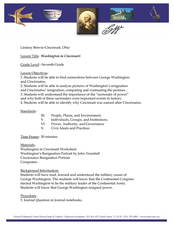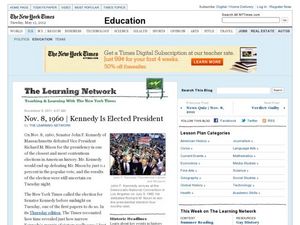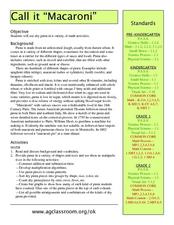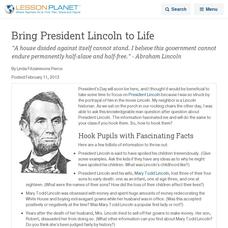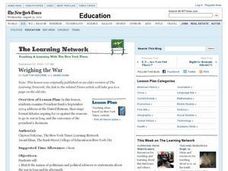Curated OER
Presidents Picture Book
Learners create a picture book of the U.S. presidents. They study general information about the U.S. presidents, write a sentence about each president, and create a picture book about the U.S. presidents.
Curated OER
History Review: Colonial America
Explore key moments in American history with the click of a mouse! Learners read 50 questions from different eras in early America, and watch the rest of the presentation to find more questions to answer.
Curated OER
The Great Depression: 1930s through WWII
Here is an oddly formated presentation that does have some great information and neat ideas. It includes images and text describing the causes and effects of the Great Depression, FDR, Herbert Hoover, and Eleanor Roosevelt. It also...
Curated OER
The Louisiana Purchase: Reading and Quiz
In need of informational text and a related quiz regarding the Louisiana Purchase? Here are four pages containing basic information on Thomas Jefferson, Napoleon, Manifest Destiny, and the Louisiana Purchase, plus a 15-question quiz.
Curated OER
Manners and Mores of Washington's America
Students explore the social policies of early America. In this etiquette lesson, students read George Washington's "110 Rules of Civility and Decent Behavior in Company and Conversation." Students identify expectations for their own...
Curated OER
Washington in Cincinnati
Seventh graders compare and contrast the leadership of George Washington and Cincinnatus. In this historical perspectives lesson, 7th graders research the noted Web sites to answer questions about the 2 men.
Curated OER
Exploring George Washington's Leadership
Learners examine primary documents to determine whether or not George Washington was an honest leader. In this presidential history instructional activity, students evaluate Washington's leadership prior to and during his presidency....
Curated OER
George Washington Crossing the Delaware: A Study of Setting and Character
Students examine "Washington Crossing the Delaware." For this American Revolution lesson, students analyze the painting, research its background, and then perform skits based on their findings.
Curated OER
The White House
Create a mini-White House in your classroom! After researching information about the Executive Branch and the duties of the president, learners construct an accurate three-dimensional replica of a portion of the United States White House.
Curated OER
Gettysburg Readdressed
Students engage in a lesson that is concerned with the creation of The Gettysburg Address set within a modern context. They read the entire speech and then brainstorm to create modern ideas that are similar. Students compose a modern...
Curated OER
Nov. 2, 1976 | Carter Defeats Ford in Presidential Election
After reading about the presidential race in 1976, learners think critically about presidential legacy. They read all of the provided background information, related New York Times articles, and then respond to a writing prompt via blog...
Curated OER
What Do You Think of Obama's Oval Office Speech on the Oil Spill?
Kids age 13 and older are asked to read the provided Times article and background information in order to construct a thoughtful blog response to Obama's first Oval Office speech. They work to address each of the related critical...
Curated OER
Nov. 4, 2008 | Obama Is Elected President
Read this interesting background information regarding the presidential election of 2008. Your class will read the provided passages and then answer four critical thinking questions that require them to consider the reading and what they...
Curated OER
Nov. 8, 1960 | Kennedy Is Elected President
Using the presidential election of 1960 as background information, learners consider the push of electoral reform. They read about the events and issues surrounding President Kennedy's win in 1960 and compare them to the same issues...
Curated OER
Exploring Height with Abe Lincoln
Young scholars examine a life-size count out of Abraham Lincoln to get a visual comparison of their height and Lincoln's. They work in pairs and trace each other's body and measure from head to toe in inches using a ruler. They then...
Curated OER
Call it "Macaroni"
Who knew there were so many fun educational opportunities featuring pasta? Scholars read a brief informational text about the history of pasta (note that "macaroni" is spelled two different ways, so address this if kids are reading...
Curated OER
Bring President Lincoln to Life
"A house divided against itself cannot stand. I believe this government cannot endure permanently half-slave and half-free." - Abraham Lincoln
Curated OER
Harry S. Truman
In this reading comprehension instructional activity, learners read facts about Harry S. Truman and choose from multiple choice answers to evaluate their comprehension. Students answer three multiple choice questions.
Curated OER
Weighing the War
Study opposing viewpoints with this lesson, which examines President Bush's September 2004 address at the United Nations. Middle schoolers study the text of the address, and then stage formal debates arguing for or against the reasons to...
Curated OER
Freedom by the Fireside: The Legacy of FDR's "Four Freedoms" Speech
Students read and analyze Franklin Delano Roosevelt's 1941 State of the Union Address. They listen to recordings of speeches by F.D.R., answer discussion questions, and participate in a debate.
Curated OER
More than a Hostess: The Role of First Ladies
A study of the country's First Ladies deepens understanding of their role in history.
Curated OER
Introduce Vocabulary: A Picture Book of Abe Lincoln (Adler)
The story of Abe Lincoln serves as the backdrop to this vocabulary-in-context activity as you read David Adler's A Picture Book of Abraham Lincoln. Scholars learn these politically themed words before listening to you read the story...
Curated OER
Pass This Jobs Bill
It seems that print media is slowly being replaced by electronic versions. Get your kids reading the New York Times e-style. They'll read the provided article entitled, "Pass This Jobs Bill" then answer six comprehension questions. Two...
National Endowment for the Humanities
The 1828 Campaign of Andrew Jackson: Expansion of the Voting Base
Students give examples to indicate how the franchise was extended and limited in the first half of the 19th century, and cite some differences in the newly enfranchised population that could affect the way they would vote.







